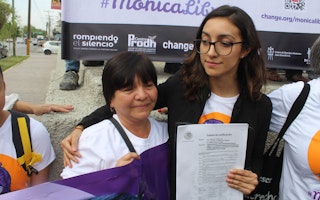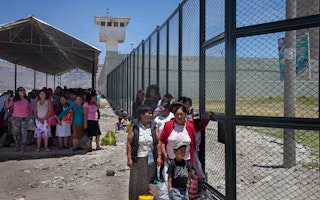Curbing Brazil's Pretrial Detention Problem
By Mary Miller Flowers
Last year, Lucas Pedroso was released from prison in Sao Paulo, Brazil, after spending 10 years in pretrial detention. Ultimately, his case was dismissed due to a lack of evidence, but Pedroso had already paid heavily for a crime no one could prove he committed.
Unfortunately, prolonged pretrial detention is common in Brazil. In an effort to tackle the problem, the Brazilian Congress passed a new law on alternative measures to pretrial detention (Law 12.403) on July 4. The law seeks to ensure that fewer people enter the prison system in the first place.
The rate of incarceration in Brazil has tripled in the past 15 years and prisons are severely overcrowded. Brazil has the fourth largest prison population in the world, almost half of which is in pretrial detention. Poor and inhumane conditions of detention are commonplace. Facilities hold many prisoners who commit petty, nonviolent crimes, and people wait months, sometimes years in prison. In the end, many of these people receive non-custodial sentences.
Law 12.403 underscores the principle that pretrial detention should be the exception not the rule. It puts forth nine alternatives to pretrial detention, such as bail and electronic monitoring. For first-time offenders who are accused of nonviolent crimes, which if convicted could carry up to four years in prison, the judge cannot impose pretrial detention. The law requires that pretrial detention be used as a last resort, and even then only in very specific instances.
The passage of the law marks an important victory for civil society organizations in Brazil. The law had been circulating in the Brazilian Congress since 2001, but never ranked high on the government’s legislative agenda. In January, a coalition of NGOs working on criminal justice reform launched a campaign in support of the bill. Three groups in particular—Conectas, Instituto Sou da Paz, and Pastoral Carcerária (all of them Open Society grantees)—led advocacy efforts.
Changing the minds of lawmakers was no easy task. With rates of violent crime high throughout the country, many feared that the law would open the doors to the prisons and let suspected “criminals” roam the streets.
To counter these fears, civil society groups shared with legislators the stories of people currently in pretrial detention who would benefit from the law’s passage. These included people accused of petty theft or shoplifting who should not have been in prison in the first place. The terrible conditions, violence, and even torture these people experience are shocking. As Julita Lemgruber, director of the Association for Prison Reform and former director general of the Penitentiary System of Rio de Janeiro, notes in a recent op-ed, “With the new law it is clearer than ever: we cannot maintain in prison, awaiting trial, men and women who, if convicted, would receive a non-custodial sentence, such as community service.”
Civil society activists also worked closely with allies in the Ministry of Justice to determine key targets and arguments. In addition to sharing first-hand accounts, the activists also had data about the costs of prolonged pretrial detention to the government and society at large. While compromises had to be made – ultimately the bill passed with a provision that preserves special privileges for detainees from elite backgrounds – the new law offers hope for reducing pretrial detention across the country.
Now the fight is to ensure effective implementation. One of the biggest challenges will be making sure that judges apply the law. Many judges argue that there is a lack of resources and institutional structures in place to monitor alternatives to pretrial detention. While changes will need to be made, some judges are already applying alternatives. The civil society coalition is developing a strategy that will combine litigation, campaigning, and work with justice sector actors to ensure the law moves from paper to practice.
Until August 2019, Mary Miller Flowers was an associate director for justice with the Open Society Human Rights Initiative.


